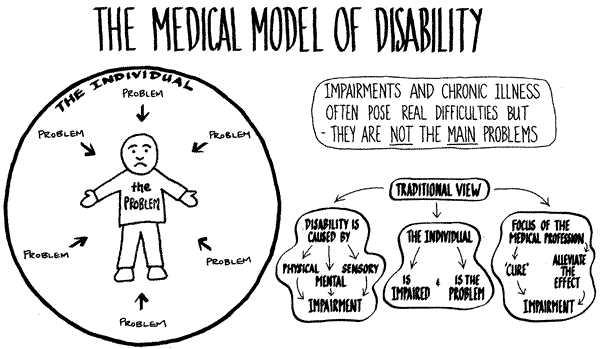There are several ways of understanding disability. These are called ‘models’ because they’re ways of looking at the world and understanding it. When considering what we mean by the word ‘disabled’, it’s important to look more broadly at the ideas behind the word. The ‘models’ of disability are ways of understanding what we mean when we talk about disability. They look for patterns, and then describe those patterns.
One of these ways of understanding disability is the ‘medical model of disability’ and that’s the focus of this blog. This sees disabled people as broken, and in need of repairing to a ‘normal’ state. Where we can’t be fully repaired, we should be accommodated as far as possible, but we are the deviation from the norm. It focusses on finding treatment and cures for disabled people, but where that can’t be done, it sees disability as an individual issue.
As someone who struggles with pain and fatigue, and with the progressive nature of my illness, I used to be very fond of the medical model of disability. I desperately wanted a cure – and in many ways I still do. As I lose abilities, my body prevents me doing many of the things I loved. I feel, in some ways, like I’m fundamentally broken.
I know a lot of disabled people feel similarly, and many like the ‘medical model’ for that reason. When your problems feel like they primarily come from your body not working in the way that you would wish, it’s reasonable to like a model that focuses on that, and on the treatment and cure you need access to.
However, I’m now very critical of this way of understanding disability. I once had a sudden brainwave in which I realised that these ‘models’ aren’t about my individual relationship with my body and how it works, they’re about the relationship between disabled people as a whole and society. That relation isn’t defined by the limits our bodies put on us, it’s defined by the things an inaccessible society prevents us from doing.
The medical model also sees being disabled as something inherently bad, which I don’t agree with. I have diagnosed learning difficulties, but I don’t see them as a bad thing. I see it as a problem that the world is built in a way that doesn’t work for me, but I wouldn’t get rid of those learning difficulties. While I struggle with attention, concentration, and visual memory, and my fluid IQ is low, I have great spelling, great word-memory, and my crystallised IQ is high. I find it difficult that, for example university lectures often last two hours – I’d do far better with 8×12 minute sessions, each followed by a 3 minute break, but I like having a brain that works the way mine does.
The world also sees my physical conditions as tragic – what we sometimes call the ‘personal tragedy’ model. It would see it as a massive waste – but the reason I’m doing well at my Master’s is because I understand health policy from the patient perspective better than other students. The reason my solo show is so great is because it really plumbs the depths of illness to find resilience and joy. The experiences I’ve had have made me who I am – and I like who I am. I don’t think it’s a tragedy to be myself at all.
When I think of what it means to be disabled, I think of all the things I’m prevented from doing. I think about the shops I can’t get in. The employers that wouldn’t take a second look at me. The inaccessible London Underground. The attitudes, environment, and structures I face, and the way in which they impact my life. I know that I can’t change my body, but that changing the world would improve it for a lot of disabled people, not just me.
Next week, I’ll write about the ‘social model of disability’ and what ‘disabled’ means in that sense. I’ll talk about why that way of understanding disability makes a lot more sense than the medical way, and the options it offers us for looking at how to change the world.
